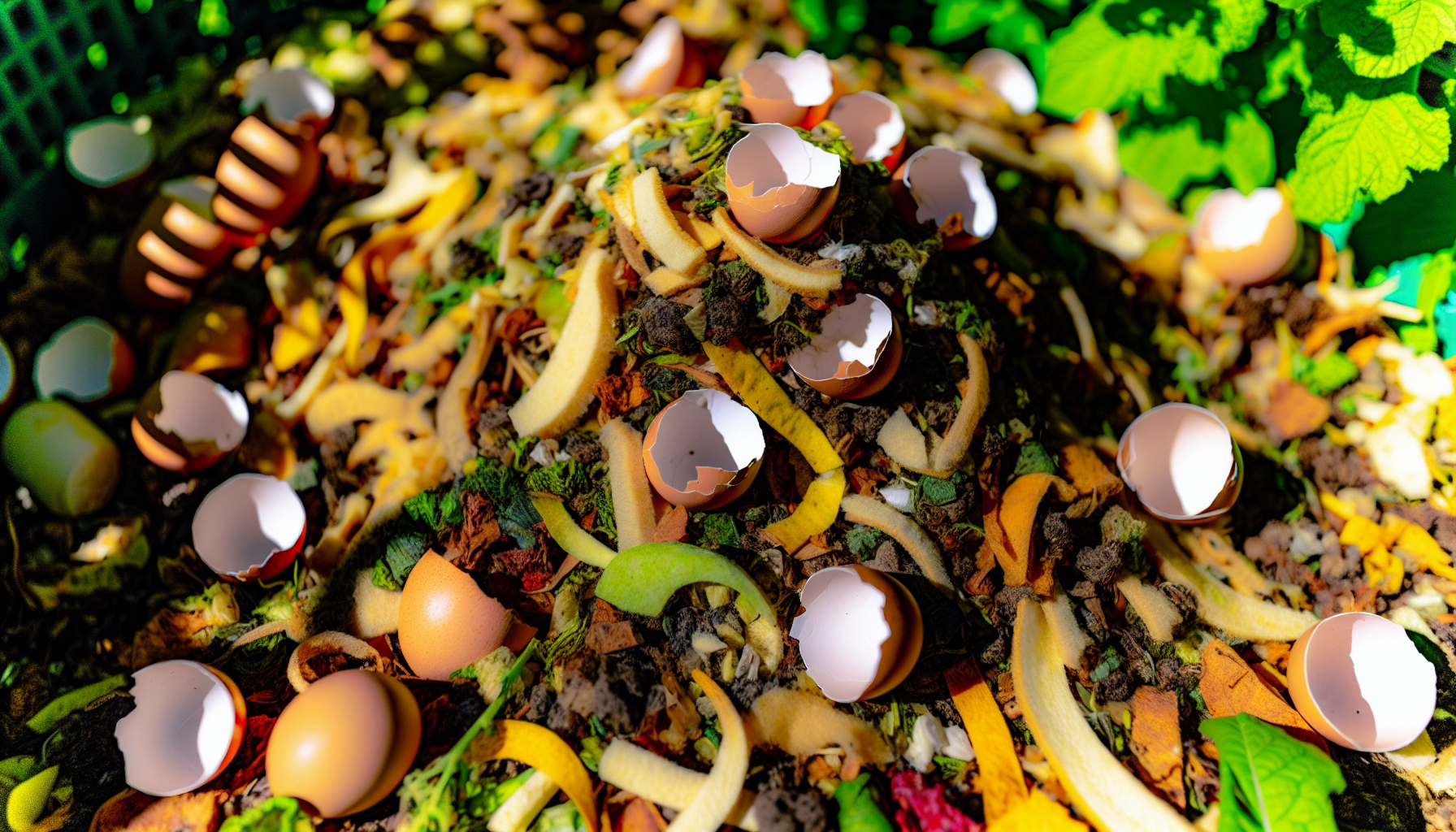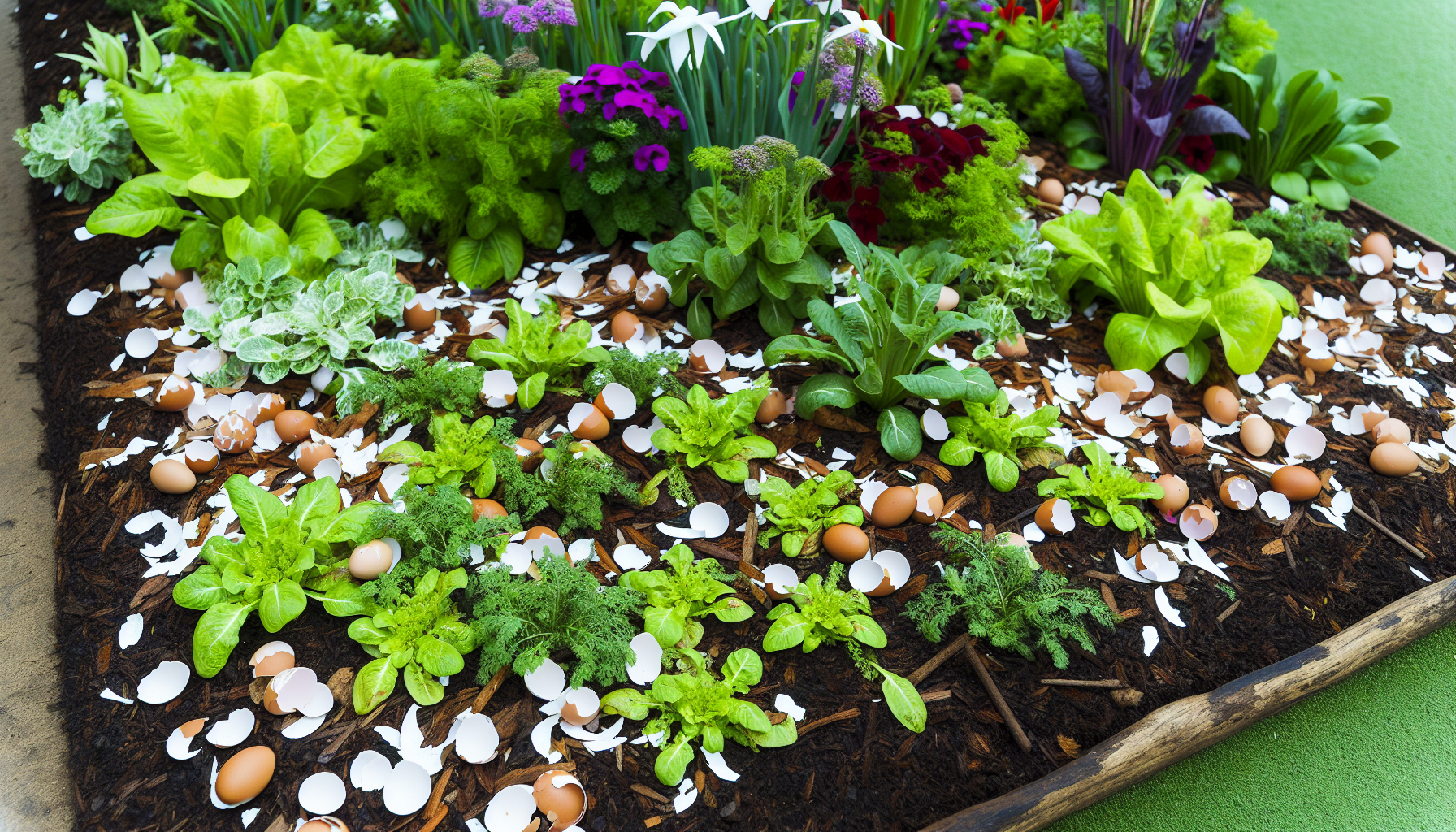Unlocking Plant Potential: Easy Ways to Use Eggshells for the Garden Growth
Gardening enthusiasts are always on the lookout for cost-effective and eco-friendly methods to enhance the growth and vitality of their plants. One such natural solution that has gained popularity over the years is using eggshells. These common kitchen waste items can be a valuable resource in your garden, providing essential nutrients and benefits to your plants.
In this article, we’ll explore the various ways you can unlock the potential of eggshells to boost your garden’s growth and health.
The Marvels of Eggshells for Plant Growth
Imagine turning your morning omelet’s leftovers into a powerhouse of plant health. That’s the magic of eggshells! Packed with nutrients like calcium carbonate, potassium, and phosphorus, they’re like superfoods for your garden, helping plants to grow stronger and healthier. They even improve soil quality by adding essential nutrients and enhancing its structure.
Not only do they nourish your plants, but they also help prevent a common gardening issue known as blossom end rot. Curious? Time to delve deeper!
Calcium and Cell Walls
Ever wondered why calcium matters for plant growth? Just as it fortifies our bones, calcium strengthens plant cell walls, helping to construct a robust structure. Eggshells, being rich in calcium carbonate, are a fantastic source of this vital nutrient. Whether you’re growing tomatoes, peppers, or roses, adding crushed eggshells provides a slow-release calcium supply that these calcium-hungry plants love.
However, calcium doesn’t function in isolation. In combination with acidic pectin in the cell wall, it facilitates structural cohesion, fortifying the plant against external factors. From root to petal, the calcium boost from eggshells benefits every part of your plant, leading to healthy growth and bountiful harvests.
Ground Eggshells Boost Soil Quality
Beyond providing calcium, ground eggshells work wonders for your garden soil. They release important nutrients, enhancing soil quality for healthier, happier plants. This beneficial effect isn’t just about nutrients. Finely crushed shells can improve the soil structure, making it more airy and improving drainage.
The process of preparing eggshells for this purpose is straightforward. Simply dry them thoroughly, pulverize them into a fine powder, and disperse it around your plants or incorporate it into the soil. Regularly adding about two tablespoons of finely ground eggshells per plant can transform your garden soil into a nutrient-rich paradise.
Eggshells Prevent Blossom End Rot in Your Garden
Ever noticed a tomato or pepper with a rotten, sunken end? That’s blossom end rot, a common issue caused by calcium deficiency. The good news? Eggshells can help! By adding a sprinkle of crushed eggshells to the soil, you can provide a slow-release calcium source that helps prevent this pesky problem.
When sprinkled around the root ball during planting, the eggshells gradually break down, releasing calcium into the soil. This ensures that your plants have an adequate calcium supply for fruit development, preventing blossom end rot.
So, next time you’re planting tomatoes or peppers, remember to add a dash of eggshell power!
How To Craft Your Own Organic Pest Control

Just as eggshells nurture your plants, they can also safeguard them from unwanted visitors. Crushed eggshells act as a natural pesticide, deterring crawling pests from nibbling on your precious greens.
Let’s explore further how eggshells can serve as a primary defense mechanism for your garden.
Sharp Edges Deter Pests
Crushed eggshells don’t just look menacing to pests, they genuinely are! Their sharp edges can cut and deter crawling bugs and insects like slugs, snails, and beetles. It’s like a protective barrier for your plants, ensuring that pests think twice before crossing the eggshell line.
But don’t just take our word for it. Studies have found that crushed eggshells can reduce slug feeding by up to 80%. Just ensure you crush the eggshells into small pieces to maximize their pest-deterrent potential.
Using Eggshells as a Barrier
Formulating a pest barrier with eggshells is remarkably straightforward. Just scatter crushed eggshells around the base of your plants or directly onto the pests. This creates a protective boundary that prevents pesky pests from reaching your plants.
While this barrier is effective against a range of insects, it’s particularly useful for deterring slugs, snails, and beetles. To maintain this protective ring, remember to replenish the eggshell barrier whenever you plant something new or notice the eggshells breaking down considerably in the garden. Your plants, especially slug and snail-prone ones like tomatoes and marigolds, will surely thank you!
Enriching Compost with Eggshells

Now, let’s move our attention from the garden soil to the compost heap. Eggshells, with their rich nutrient content and compost-friendly properties, can be a valuable addition to your compost bin. They not only enrich compost with calcium but also play a role in maintaining its pH balance and speeding up its breakdown.
Balancing the Compost’s pH
Composting is a delicate process, and maintaining the right pH level is essential for its success. Enter eggshells. Composed mainly of calcium carbonate, eggshells are alkaline, helping to keep the compost’s pH in the right range for efficient decomposition.
As the compost breaks down, its pH naturally changes. Starting off at a high pH of around 8.5, it gradually settles into a garden-friendly range between 6 and 8 – and eggshells can help it get there.
By gradually releasing their alkaline content as they decompose, crushed eggshells can help adjust the pH level of your compost pile, ultimately making nutrients more available for your plants.
Speeding Up Compost Breakdown
Beyond balancing pH, eggshells can also speed up the composting process. When crushed into smaller pieces, eggshells present more surface area for decomposition, aiding in faster breakdown. This not only shortens the composting process but also enhances the overall quality of the compost.
Preparing eggshells for composting is straightforward. All you need to do is crush them into a fine powder and sprinkle them over the compost pile, mixing them in thoroughly with a rake or shovel. Regularly adding this calcium-rich ingredient can transform your compost into a nutrient powerhouse, making it even more beneficial for your garden.
Innovative Seed Starting with Eggshells

Now, let’s shift our focus to the intriguing realm of seed germination. Eggshells, with their natural cup shape and nutrient content, make for an excellent and eco-friendly seed starting container. They provide a sustainable way to nurture your seedlings while offering additional benefits to your young plants.
Let’s discover how to transform breakfast remnants into an ideal nursery for your seeds.
Preparing Eggshell Seed Starters
The journey from egg breakfast to seed starter is pretty straightforward. Here are the steps:
- Rinse the eggshells thoroughly.
- Sterilize the eggshells by baking them at 200°F for 30 minutes.
- Let the eggshells cool.
- Fill the eggshells with seed starting mix.
- Plant your chosen seeds in the eggshells.
Now you have a creative and eco-friendly way to start your seeds!
When it comes to creating planting holes, a thin needle or pin will do the trick for drainage. Simply poke the bottom of the eggshell and, if needed, widen the hole for effective drainage. While the size of the eggshell doesn’t really matter, using the deeper half and filling it up with a seed starting mix can provide your seeds with a comfortable growing space.
Planting with the Whole Eggshell
Once your seedlings have sprouted and are ready for their move to the garden, the whole eggshell can be planted directly into the soil. This reduces transplant shock and offers a dose of nutrients to your young plants as the eggshell decomposes.
In addition to providing a nutrient boost, planting the whole eggshell also helps keep pests at bay, thanks to its sharp edges. This means that not only do you give your seedlings a nourishing start, but you also protect them from potential threats, making eggshells the ultimate seed starting solution.
Eggshells as Natural Fertilizer and Mulch

Let’s pause and recognize eggshells in yet another role – serving as a natural fertilizer and mulch. Eggshells can return essential nutrients to the soil, providing a slow-release calcium source that can be particularly beneficial for calcium-hungry plants. But their benefits don’t end there.
They also double up as a protective mulch, helping to conserve soil moisture and deter pests. Let’s dissect this further.
Finely Ground for a Calcium Boost
When finely ground, eggshells and coffee grounds can be easily incorporated into the soil, providing a rich source of calcium and other nutrients. This crucial nutrient plays a significant role in plant health, contributing to strong cell structure and root development.
Preparation is simple: dry the eggshells, grind them into a fine powder, and sprinkle it around your plants or mix into the soil. Regular applications – about every few weeks or whenever your soil appears to need a calcium boost – can help maintain healthy calcium levels in your garden soil.
Large Pieces as Protective Mulch
On the other hand, larger eggshell pieces can serve as a protective mulch, helping to conserve soil moisture and deter pests. This two-pronged benefit not only reduces your watering needs but also keeps your plants safe from crawling pests.
Preparing eggshells for this purpose involves baking them in the oven for about an hour or simply drying and crushing them manually. Sprinkle them around your plants to create a protective layer. Regular replenishment ensures continuous protection, leading to healthier, happier plants.
Crafting Bird-Friendly Calcium Supplements from Eggshells
Eggshells aren’t just a boon for plants and pests; they’re also a treat for our feathered friends. Providing birds with eggshell supplements can support their health, offering vital minerals that contribute to strong bones and good egg production.
Let’s find out how to ready egg shells for our feathered friends by adding egg shells to their diet.
Cleaning and Sterilizing Shells for Birds
Before serving eggshells to birds, it’s crucial to ensure they’re clean and safe. This involves rinsing them well and then sterilizing them in the oven to eliminate any potential bacteria. While this step requires a little effort, it’s essential for the birds’ health, preventing any potential disease transmission.
Once sterilized, the shells are ready for the birds. They can be served as they are or crushed into smaller pieces or a fine powder, depending on the bird species and their feeding habits.
How to Serve Eggshells to Feathered Friends
Feeding eggshells to birds is as simple as scattering them in your yard or adding them to bird feeders. They can be served alone or mixed with birdseed, providing a calcium boost that’s particularly helpful during the nesting season.
While eggshells are generally safe for birds, it’s important to ensure they’re part of a balanced diet. Too much calcium can be as harmful as too little, so make sure your feathered friends are getting a variety of nutrients from their diet. With the right balance, eggshells can be a helpful supplement, contributing to the health and vitality of your local bird population.
Read also: How to Use Chicken Manure Properly in the Garden
Frequently Asked Questions
How do you prepare eggshells for plants?
To prepare eggshells for plants, crumble them into a pot, cover with water, boil, let it cool overnight, strain, and use the water to water indoor plants for added nutrients. You can also speed up the process by turning eggshells into powder using a coffee grinder.
Which plants like eggshells?
Plants like tomatoes, aubergines, strawberries, flowers, and many succulents benefit from eggshell fertilizers. Just be careful not to overwater the succulents.
Can you put eggshells on top of soil?
Yes, you can put eggshells on top of soil to provide calcium carbonate, which can help lower the soil’s pH level and make it more alkaline, benefiting plant growth. If you need a quicker calcium boost for your plants, consider using water-soluble calcium.
Are coffee grounds and eggshells good for the garden?
Yes, coffee grounds and eggshells are good for the garden as they provide nutrients like nitrogen and calcium, supporting healthy plant growth in almost any soil bed. So, you can save these kitchen scraps to boost your soil’s fertility.
Can I use eggshells from any type of egg for my garden?
Yes, you can use eggshells from any type of egg as long as they are clean and dry.
Final Thoughts
From boosting plant health to deterring pests and nourishing birds, we’ve cracked open the myriad benefits of eggshells. By incorporating eggshells into your gardening routine, you unlock a sustainable and effective way to enhance your garden’s health while reducing waste. Remember, those eggshells from your breakfast aren’t just kitchen scraps; they’re a treasure trove of benefits waiting to be harnessed. So, next time you crack an egg, think twice before tossing the shell away!




